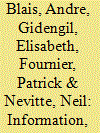| Srl | Item |
| 1 |
ID:
086766


|
|
|
|
|
| Publication |
2009.
|
| Summary/Abstract |
This article assesses the aggregate effect of information shortfall on the outcome of the last six Canadian elections. Building on Bartels' analysis, the authors find an information effect in three of the six elections examined, and in each case the information gap benefits the Liberal Party. That finding raises the question: why does information matter in some contexts but not in others? It is argued in this article that the information gap is related to lack of visibility. When and where all political parties have some degree of visibility, the less informed vote like the better informed, but when and where a party is hardly visible, the less informed are less likely to support that party. The less informed appear to consider a smaller set of options when they decide how to vote.
|
|
|
|
|
|
|
|
|
|
|
|
|
|
|
|
| 2 |
ID:
096282


|
|
|
|
|
| Publication |
2010.
|
| Summary/Abstract |
While studies typically find that women know less about politics than do men, feminist scholars have argued that these findings reflect gender-biased measures that underestimate women's political knowledge. This article evaluates the feminist critique by taking a more expansive view of what constitutes political knowledge. Using data from a large Canadian urban sample, we show that gender gaps close or even reverse when people are queried about more practical aspects of political knowledge, such as government benefits and services. Our results also demonstrate that this type of knowledge is more equally distributed than its conventional counterpart, though the women who are the most likely to need government services and benefits are often the least likely to know about them. Finally, we show that knowledge of government services and benefits has a significant effect on women's intended vote choice. This article thus shows that more practical types of political knowledge might serve as meaningful additions to existing definitions and measures of political knowledge.
|
|
|
|
|
|
|
|
|
|
|
|
|
|
|
|